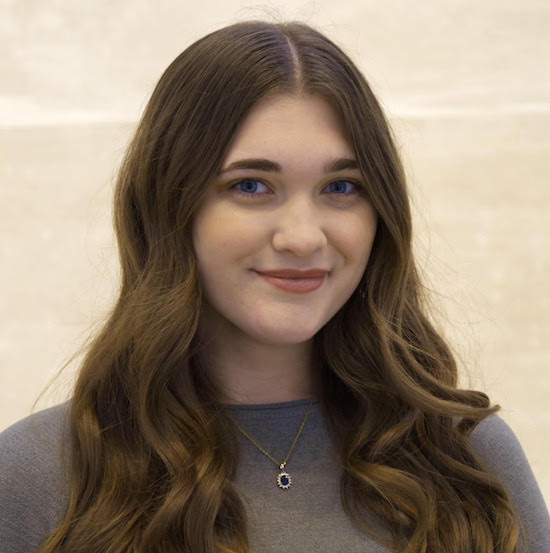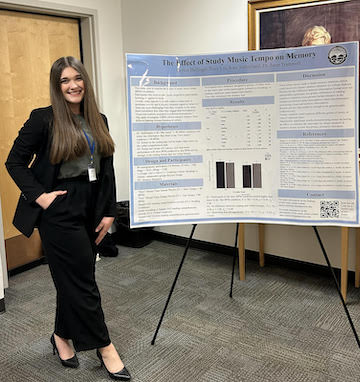Seaver College Student Payton Ballinger Analyzes Effect of Music on Memory in Latest Research

There are turning points in life—moments that alter one’s course of progress. They sneak up at the least likely time, demand attention, and open up new and unexpected doors.
These turning points vary in form. Some are random, appearing seemingly out of thin air. Whereas others are self-manufactured—created by individuals who possess the courage necessary to reach beyond what they know and aspire after something greater. Such was the case for Payton Ballinger, a double major in psychology and music at Seaver College, who’s turning point came when she auditioned for and earned a musical scholarship to attend Pepperdine University.
“The population of the Pepperdine student body is larger than that of my hometown,” says Ballinger “Higher education wasn't really a thing where I grew up, but my music teacher, Beth Munce, encouraged me to audition in front of Pepperdine professors Ryan Board and Ida Nicolosi. They were very kind and made it financially work for me to attend Pepperdine.”
Born and raised in Peculiar, Missouri—population 5,621—Ballinger did not anticipate traveling 1,600 miles away from home to attend Seaver College. Peculiar is not known for its educational prowess, as just 21 percent of its population holds a bachelor’s degree or higher. However, once it became financially feasible to explore added schooling outside of America’s breadbasket, Ballinger leapt at the chance.
Since embracing her Pepperdine adventure, the Seaver College junior has discovered transformative and purposeful passions which she is committed to using to help others. Ballinger’s niche interests lie at the intersection of music and psychology. By combining these two fascinations, she has discovered an aptitude for research.

The Seaver College Newsroom previously summarized Ballinger’s most recent study regarding music and memory, but her story warrants more extensive analysis. By peering behind the curtain and investigating how the human brain digests rhythmic sound, Ballinger made progress in illustrating how music could be dulling our cognitive skills.
“I typically don't listen to music when I study, but sometimes, if there's too much going on in the world around me, I'll pop in headphones to give myself some white noise,” says Ballinger. “I was really interested in seeing whether that action was having a detrimental effect on my study habits—and if music was affecting the people around me and their ability to think clearly.”
Spurred on by an assignment in her Research Methods course, Ballinger and her colleagues Tony Lin and Kate Sutherland, under the direction of Dr. Janet Trammell, designed, conducted, and reported on a research project investigating how music affects memory. They began this process by creating a literature review centered around music and cognitive ability. Scouring databases searching for relevant research papers on music and memory, the team found that psychologists had already studied the effects different musical genres, such as rock and roll or hip-hop, have on memory. However, no studies looked specifically at the variable of tempo.
After devising this original approach to the scholarship, Ballinger and her cohort designed a simple experiment. They recruited 40 individuals to take sample SAT reading comprehension tests. Half of these participants would listen to fast-tempo songs, or songs exceeding 80 beats per minute, while digesting the written material; the other half did the reading while listening to slower-tempo tracks. By comparing the different test results of both groups, the undergraduate researchers found that faster songs decrease one’s ability to recall details; slower songs have a less dramatic effect.
Ballinger’s fascination with the brain began when her grandmother was diagnosed with brain cancer. Moved by this misfortune, she was inspired to help advance the study of neurology. Her project, “The Effect of Music Tempo on Memory,” has affirmed her ability to contribute to this field through research, and it serves as an important initial step in her determination to help others.
“I have a lot of different ideas about what I’d like to study next,” she says. “I would love to do some sort of research investigating working memory. In 1980 psychologist Alan Baddeley hypothesized that our short-term memory is divided into three different sections—an executive function, a phonological loop, and a visuospatial sketchpad. I would love to build on these concepts and create practical applications that could benefit students.”
Defying her rural roots and moving to the West Coast seemed an unlikely journey for Ballinger, but her experience at Pepperdine has only furthered her resolve to reach for a life beyond what is expected. As a student at Seaver College, she’s discovered a broader purpose centered around helping future generations improve and maintain cognitive abilities.
“I always wanted to help people,” Ballinger says. “I’ve found different ways to do that now.”